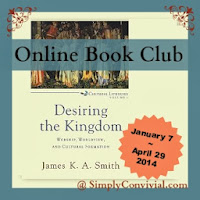
I am pleased to join with other mother's who are studying Desiring the Kingdom by James K.A. Smith this semester. My librarian husband isn't keen on buying more books for our house, but I did convince him we should get this one - for Christmas. He wasn't going to get it for the library - so we added it to our personal collection.
This book has been the talk of many Classical Christian educator circles so I am aware of the premise. This might have stolen some of the thunder of the introduction (especially his discussion of the mall). His focus is on college age students, but the concepts can apply to any age. He is arguing that education is much more than just information, it is formation. This formation comes through liturgies, practices or habits. Often we use the term liturgy to talk about the form of our worship but he wants to expand this idea to help us think about cultural liturgies that shape us - the mall, sports events, etc. He wants us to consider how these practices form us at a level even more basic than our thinking - a physical level.
Honestly, this is one reason I wanted to raise my children in a liturgical church. My husband was bored by the repetition - but the calesthenics of sit, kneel, stand and using the same words every week has a way of forming us in ways we don't expect. I really don't have words to explain why this is so important to me, so I hope that this book gives me some more ideas about how to better explain this to my friends who are a little freaked out by liturgical churches. I also wanted to have communion regularly which is not possible in many non-liturgical churches. At one point in a reformation class in (a secular) college we talked about the difference between a service ending with the message or sermon and one which ends with communion. The professor contended that if you held the word central then you would end with it as the last thing to make an impact. Ending with communion sends a very different message about what is central to worship. It will be interesting to see if he discusses something similar later in the book.
In some ways I think he is going to be discussing similar ideas that are found in Poetic Knowledge. When I read this quote
And that precognitive or prerational orientation to the world is shaped and primed by very material, embodied practices. Thus such a pedagogy is much more attune to the formative role of ritual.
It makes me think of some of the ideas encountered in Poetic Knowledge. The approach is very different and we'll see how it shapes up - but it seems they are discussing some similar concepts. They are focusing on not putting the mind at the center of our education - but forming or developing the whole human - body, mind and spirit.
I am interested to see what he has to say next.

Thanks for your thoughts. I really like the point made about worship that ends with communion. Great food for thought!
ReplyDeleteYes, so far it sounds very much like Poetic Knowledge, but with a different vocabulary (and personality). :)
ReplyDeleteI'm so glad you're joining us!
This brought Poetic Knowledge to my mind, too. And so did Jen! That is a sure sign we're on the right track, I think. :)
ReplyDeleteI'm with Lisa on your point about ending with communion (which our church does as well). I will have to think about that some more...